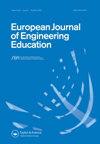开发一个现实世界的场景,以促进学习和工作4.0 -在过程工程实验室教育中使用喷射泵实验的数字孪生体
IF 2.8
Q2 EDUCATION & EDUCATIONAL RESEARCH
引用次数: 0
摘要
摘要:一个新开发的沉浸式虚拟现实在线实验室实验用于过程工程专业的学生。使用游戏引擎虚幻引擎4实现了喷射泵的数字孪生(DT)。为了更好地整合工作世界4.0(W4.0)不断变化的能力需求,我们利用这个机会对教学进行了重新设计,偏离了传统的烹饪书实验。使用真实世界场景(RWS)来解决W4.0中有时模糊的解决问题的作业:学生们发现自己处于一个模糊的境地,必须进行建设性的澄清和解决并且由它们自主。RWS通过三角测量定性和定量方法进行评估。首先,评估了其建设性一致性,即通过新的教学活动实现的预期学习结果是否也反映在评估任务中。其次,调查了学生对这种新形式的实验室学习的态度。研究结果表明,即使学生最初看起来被陌生类型的作业淹没了,他们仍然能够解决与工作相关的工程问题——至少在虚构的直接上级的不同程度的帮助下。学生们很欣赏有机会创造性地思考并独立制定作业解决方案。本文章由计算机程序翻译,如有差异,请以英文原文为准。
Developing a real-world scenario to foster learning and working 4.0 – on using a digital twin of a jet pump experiment in process engineering laboratory education
ABSTRACT A newly-developed online laboratory experiment in immersive virtual reality (VR) is used for process engineering students. A digital twin (DT) of a jet pump was realised using the game engine Unreal Engine 4. The chance was taken for an instructional redesign deviating from the conventional cookbook-experiment to better integrate the changing competence demands of the working world 4.0 (W4.0). A real-world scenario (RWS) is used to address the sometimes-vague problem-solving assignments of W4.0: the students found themselves in an ambiguous situation which must be cleared and resolved constructively and autonomously by them. The RWS was evaluated by triangulating qualitative and quantitative methods. Firstly, its Constructive Alignment was evaluated, i.e. whether the intended learning outcomes to be achieved through the novel teaching and learning activities were reflected in the assessment tasks, too. Secondly, students were surveyed regarding their attitudes towards such new forms of laboratory learning. The results show that even if the students initially seem overwhelmed by the unfamiliar type of assignment, they are nevertheless able to solve the work-related engineering problem – at least with varying degrees of assistance from a fictional immediate superior. The students appreciate the opportunity to think creatively and independently develop solutions to the assignment.
求助全文
通过发布文献求助,成功后即可免费获取论文全文。
去求助
来源期刊

European Journal of Engineering Education
EDUCATION & EDUCATIONAL RESEARCH-
CiteScore
7.30
自引率
13.00%
发文量
64
期刊介绍:
European Journal of Engineering Education is published six times a year in print and electronic editions and provides an essential forum for dialogue between researchers and specialists in the field of engineering education, at European and worldwide levels. European Journal of Engineering Education is the Official Journal of SEFI, the Socièté Européenne pour la Formation des Ingénieurs (the European Society for Engineering Education). SEFI is a non-governmental organization whose aims are to develop information about engineering education, to improve communication and exchange between professors, researchers and students and to promote cooperation between the various institutions concerned with engineering education.
 求助内容:
求助内容: 应助结果提醒方式:
应助结果提醒方式:


